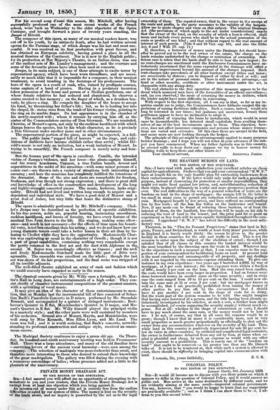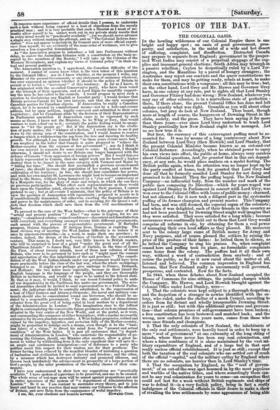COLONIAL POLICY.
TO THE EDITOR OP THE SPECTATOR.
Leaeow Castk, 8th January 1850. Sui—It would ill become me to discuss withyou those points on which it appears we differ in the question of Colonial Policy, and it would answer no public end. Men arrive at the same destination by different roads, and we are evidently aiming at the same result—improved colonial government. You say, however, that " you would be happy to learn that my suggestions are practically available"; and as I think I can show them to be :o, I ad- dress to you this second letter. It requires more experience of official details than I possess, to undertake such a task without being exposed to a host of objections from the merely practical man ; and it is very probable that such a theorist as I must of ne- cessity allow myself to be, cannot work out in my private study results that in every detail would be "practically available" ; yet we should never advance a single stop without making the attempt, and as " The Colonial Reform Asso- ciation " does not appear to include in its Council men of more official experi- ence than myself, we are evidently of the same order of workmen, not to give ourselves a less respectful denomination. As "the Association propose to introduce a bill into Parliament without delay, to endow the Australian Colonies with a constitution on the basis ac- oepted by the members of the Society," I will take up the Colonies of the Western Hemisphere, and explain my views of Colonial policy "in their ac- tual and present position." The Annexation question is, I apprehend, the Canadian difficulty of the moment. I cannot of course know what is the view taken of this question by the Colonial Office ; nor do I know whether, at the moment I write, any Minister of the present Government, or any statesman of eminence whatever, has ever expressed an opinion whether it should be the policy of Britain to permit or to forbid a "movement" of this tendency. As far as I know, it has originated with the so-called Conservative party, who have been vexed at the triumph of their opponents, and at Lord Elgin for manfully support- ing the men he has called to his councils. I would propose to meet such a question by disclaiming any English or Loyalist party : I would declare that Britain governs Canada for her own interest, and that she only recognizes Canadian parties for Canadian objects. If Annexation be really a Canadian object, let it be mooted by constitutional means—not by a hole-and-corner address, but by open petition, legally conveyed and submitted to their own Legislature ; and let Canadians abide by the decision of their Representatives in Parliament assembled. If Annexation came to be expressed by such means as these, I know not the Minister, be he Whig or Tory, that would venture to turn a deaf ear to it ; certainly the public feeling would be unani- mous to "let the people go." But if the Annexation cry is the ebulli- tion of party malice, the "whisper of a faction," I would desire to see it put down by the strong arm of the constitution, and I would hasten to remove a fungus which is withdrawing the sap from the tree and injuring its healthy growth. Yet although I am warned that "in these years events move fast," I am sceptical in the belief that Canada is quite prepared to "relieve the Mother-country from the expense of her government " • nor do I think it her own interest to separate for some years to come. It indeed, I thought otherwise, I should not desire to see Britain any longer hampered with the defence of Canada " from aggression of foreign powers." But I would fain see it fairly represented to Canada, that she might work out for herself a higher destiny than to be classed in the same category with Vermont and Maine by " biding her time." She should first accomplish a previous reconcilement of races ; she should increase the population of her wastes, and extend the cultivation of her territory; in fine, she should first consolidate her power, and with her own mighty St. Lawrence she might look to become an important rival to the States, without being hampered by a "free mil" controversy or by a Mosquito war, for the glory of stars and stripes, in which she can have no previous ficipation. What effect such representations as these would have upon the Canadian mind, already so excited by their passions, I cannot pretend to say ; but at all events I maintain, that the policy of Britain is to view the question of Annexation with equanimity. ; prepared to accede to it if constitutionally demanded, but otherwise exerting the Imperial influence and power in the maintenance of order, and in securing for the Queen's sub- jects that freedom which shall save them from the evil machinations of faction.
To proceed to the case of the West Indies—what is the grievance of their " actual and present position " ? Alas ! "my name is Legion, for we are many," —abandon ed estates—ruined confidence—discontent an d dissatisfaction with everybody and everything amongst twenty little different governments, each armed with the powers of representative government. If Barbados prospers, Guiana languishes. If Antigua lives, Guiana is expiring. The most obvious way of meeting the West Indian difficulty is to reduce it at once by nineteen-twentieths,—in a word, to make them one province • to realize, indeed, the dream of the Province of Carlisle in the seventeenth century. This name is, I doubt not, very little known to British readers, who be surprised to hear of a grant "under the great seal of all the Charibbean Islands" to James Hay, Earl of Carlisle, in the time of James the First, of about twenty islands, most of them now colonies of Great Britain, who were to be governed by laws such as "might meet the consent and approbation of the free inhabitants of the said province." The consoli- dation of all the West Indian islands under our government would have been more practicable before the close of the last war, when the whole archipelago belonged to us. It might now perhaps give umbrage to France, Denmark, and Holland ; the two latter more especially, because in their island the English language is the language of the people, and they are thoroughly British in inclination, and would be eager to be united to the federal state. Be that as it may., it would, I think, be our truest Colonial policy to unite all our de denies in the Ctuibbean Sea under one government. The seve- ral Assem .lies should be invited to send representatives to a Federal Parlia- ment; the judicature should be centrally established, to the superceasion of a host of Chief Justices and Attorney-Generals; the naval and military com- mands should also be concentrated round one Governor, who should be as- sisted by a responsible government, " for the entire relief of those distant colonies from the great evil of being ruled in local matters by a department of the Administration in London." The imagination rises to the loftiest flight in contemplating the conceivable future greatness of such an island-state, situated in the very centre of the New World, and at the portal, as it were and commanding the commerce of either hemisphere, with a marine necessarily extensive for its own absolute necessities. A West Indian proprietor, robbed and ruined by the impolicy, injustice, and sectarian folly of the Mother-country, might be permitted to indulge such a dream, even though it be the " base- less fabric of a vision," to divert his mind from the "present and actual condition" of the West Indies. It is past all endurance that "a depart- ment of Administration in London," who undertake the responsibility of go- verning the Colonies, should, one kinister after another, allow a great in- terest to wither by withholding from it the only expedient that will save k-
en ample and continuous immigration—out of deference to a party who neither merit this respect for their wisdom nor for their goodness. The
former having been evinced by the manifest blunder of mistaking a question of barbarism and civilization for one of slavery and freedom • and the other, by a measure which has destroyed industry and promoted idleness, and thrown back indefinitely the advancement in pr my of a large portion of God's people, by the utter prostration of the wealthy classes of their com- munity.
I have now endeavoured to show how my suggestions are " practically available." I have spoken of a province to be preserved, and one to be created.
The whole array of red-tape men will be armed against propositions put out in entire ignorance of the system of "a department of Administration in London." Be it so. I am content to surrender every theory, and to join heart and hand in any practice that may restore our Colonies to the affection of Britain, and save them from the consequence of woful impolicy. I am, Sir, your obedient and humble servant, EDWARD OUST.



























 Previous page
Previous page